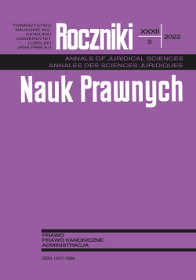The Evolution of Legal Norms Relating to the Ecclesiastical Judge before the 1917 Code of Canon Law
Abstract
The judge is the entity that applies the law. The judge adjudicates on court cases. The history of the Church shows, that from the beginning, we had to deal with the necessity to resolve various types of matters and disputes. Canon law has developed and evolved over the centuries. The procedural law developed gradually. The judge is part of this development. Initially, as indicated by the sources of law, the church judge was a bishop. With time, the power to judge passed into the hands of other priests appointed by the bishop. This is how the office of the judicial vicar (official) was created. At the Council of Trent, there is already talk of the so-called synodal and pro-synod judges.
References
Bączkowicz Franciszek, Prawo kanoniczne. Podręcznik dla duchowieństwa, t. 3, Opole: Wydawnictwo Diecezjalne Św. Krzyża 1958.
Biskupski Stefan, Prawo małżeńskie Kościoła rzymskokatolickiego, t. 2. Proces małżeński, Olsztyn: Instytut Wydawniczy PAX 1960.
Cannolly Hugh R., Didascalia Apostolorum, Oxford: Clarendon Press 1929.
Conte e Coronata Matthaeus, Compedium Iuris Canonici, vol. 1, Romae: Mariaetti 1942.
Cornely Rudolpho, Commentarius in S. Pauli Priorem Epistolam ad Corinthios, Parisiis: Lethielleux 1890.
Del Pozzo Massimo, Il processo matrimoniale più breve davanti al vescovo, Roma: EDUSC 2016.
Dębiński Antoni, Kościół i prawo rzymskie, Lublin: Wydawnictwo KUL 2008.
Erdo Péter, Władza Biskupa Rzymu. Ujęcie historyczno-prawne, ,,Annales Canonici” 2012, nr 8, s. 5-21.
Fournier Paul, Les officialités au moyen âge. Étude sur l’organisation, la compétence et la procédure des tribunaux ecclésiastiques ordinaires en France, de 1180 à 1328, Paris: E. Plon et Cie, Imprimeurs-Editeurs 1880.
Gręźlikowski Janusz, Początki i rozwój kościelnego sądownictwa w Polsce na podstawie generalnego i okręgowych oficjalatów diecezji włocławskiej, ,,Prawo Kanoniczne” 2001, nr 44, 3-4, s. 163-183.
Hemperek Piotr, Oficjalat okręgowy w Lublinie XV-XVIII w. Studium z dziejów organizacji i kompetencji sądownictwa kościelnego, Lublin: KUL 1974.
Martroye François, Les « defensores ecclesiae » aux V-e et VI-e siėcles, ,,Revue historique de droit francais et étranger”, 1923, nr 2, s. 597-622.
Pawluk Tadeusz, Prawo kanoniczne według Kodeksu Jana Pawła II, Doczesne dobra Kościoła, Sankcje w Kościele, Procesy, t. 4, Olsztyn: Warmińskie Wydawnictwo Diecezjalne 1990.
Roberti Franciscus, De Processibus, vol. I, Romae: S. Apollinaris 1926.
Rodriguez-Ocaňa R., Tribunal diocesano, [w:] Diccionario General de Derecho Canónico, red. J. Otaduy, A. Viana, J. Sedano, Cizur Menor, Navarra: Aranzadi 2012, s. 669.
Subera Ignacy, Historia źródeł i nauki prawa kanonicznego, Warszawa: Akademia Teologii Katolickiej 1977.
Wąsik Wojciech, Urząd i zadania wikariusza sądowego, „Kieleckie Studia Teologiczne” 8(2009), s. 191-214.
Wierzchanowski Rafał, Urząd oficjała w świetle norm Kodeksu pio-benedyktyńskiego i prawa partykularnego w diecezji tarnowskiej. Studium historyczno-prawne, [w:] Struktura i działalność Sądu Diecezjalnego w Tarnowie w latach 1945-1983, red. R. Kantor, Kraków: Uniwersytet Papieski Jana Pawła II. Wydawnictwo Naukowe 2019, s. 49-72.
Vetulani Adam, Początki oficjalatu biskupiego w Polsce, „Nova Polonia Sacra” 3(1939), s. 1-58.
Zabłocki Jan, Rzymskie korzenie prawa kanonicznego, [w:] Ars boni et aequi. Księga pamiątkowa dedykowana Księdzu profesorowi Remigiuszowi Sobańskiemu z okazji osiemdziesiątej rocznicy urodzin, red. J. Wroceński, H. Pietrzak, Warszawa: Wydawnictwo UKSW 2010, s. 587-594.
Copyright (c) 2022 Roczniki Nauk Prawnych

This work is licensed under a Creative Commons Attribution-NonCommercial-NoDerivatives 4.0 International License.


